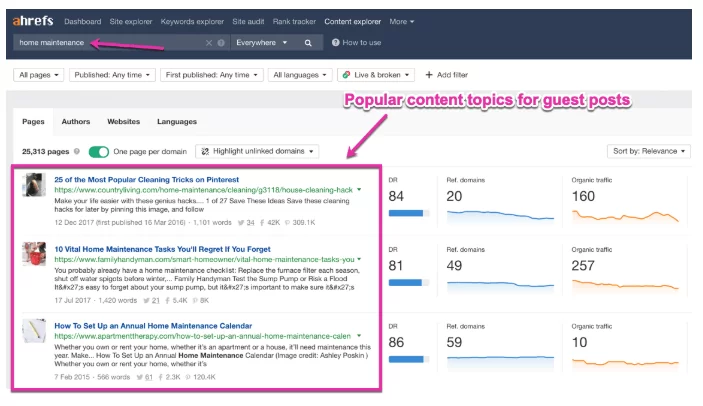Guest Blogging: What is it and Why it’s Important for Your Business
Why should you consider guest blogging? It has numerous benefits that can improve your online presence and help boost your search engine optimization (SEO). Here are just some of the ways guest blogging can improve your business and bottom line
Table of Contents

What is Guest Blogging?
Guest blogging (aka guest posting) refers to a specific type of content marketing, in which bloggers publish their content on other people’s websites. When it comes to SEO-boosting guest blogging strategy, you should avoid simple write-for-links strategies like comments spamming or publishing rehashed duplicate content from your own website.
You can optimize your guest posting efforts with smart link building and social sharing practices, including trackbacks and pingbacks. Ultimately, guest blogging helps build awareness of your brand while helping you generate quality backlinks—both of which will improve search engine rankings. Why is guest blogging important?: Some experts believe that up to 90% of all links are earned through high-quality content creation and distribution. That means there’s still room for old-fashioned link-building tactics, such as exchanging links with relevant sites or participating in forum discussions.
But if you want to boost your online visibility without breaking Google’s rules, guest blogging may be one of your best options. If done right, it can also help drive traffic to your site as well as increase conversions by improving trustworthiness and relevancy among potential customers. After all, who better than an industry expert to recommend products?
Benefits of guest blogging
There are a number of benefits to guest blogging, including SEO-Boosting guest blogging strategy. With your own content on someone else’s site, you can earn some new inbound links to your own website as well as increase social shares of your content.
Guest posting is also an opportunity to expand your network—you never know who might see your work and be intrigued enough to follow you on social media or start following you on Twitter. And more directly from a traffic standpoint, if someone shares one of your posts from another site, you will get traffic from that sharing because all those people saw that shared link when they were browsing their Facebook feed or their Twitter stream.
However, be careful not to abuse these benefits by spamming other sites with low-quality content. Google frowns upon such behavior and could penalize your site by dropping its ranking on search results pages. Instead, focus on creating quality content that adds value to readers’ lives. If you do so, there’s no reason why you shouldn’t benefit from guest blogging!
Key elements of successful guest posts
- High Domain Authority T—This is a very SEO-boosting guest blogging strategy. For example, let’s say you post on Moz’s site, which has an SEO domain authority of 85—and your post gets lots of likes and social shares because people find it interesting. When you syndicate that post on a lower domain authority site, your original content might get more shares than someone else’s post on a higher DA website; i.e., because yours was from Moz, people like you even more!
- High Traffic Website —Not all websites are created equal when it comes to traffic. Some sites may have high domain authority but low traffic, while others may have high traffic but low domain authority. Choose wisely where you want to publish your guest posts as they can help grow both aspects of your business.
- High Social Shares —It’s not just about getting published somewhere with high DA or traffic numbers; it’s also about how many people share your work once you do so. This helps build links back to your own site, which can increase its search engine ranking ability (SEO).
- Content Quality —Make sure that what you write is good quality and useful information for readers before submitting it to other sites for publication—or no one will want to share it!
- Engaging Title —The title of your guest post should be engaging enough to make readers click through and read it. It should be keyword rich enough to attract searchers, but not spammy in any way.
- High-Quality Images —If you include images in your guest posts, make sure they are high quality (i.e., sharp) so that visitors won’t leave after seeing them load slowly or appear pixelated/blurry when viewed at full size.
How to approach an organization/blogger
Before pitching your guest post to a website, make sure you know how they take on guest posts. Some websites accept pitches from almost anyone while others will only consider people with a certain level of experience or following. Also, make sure that you have something relevant to offer – if your pitch doesn’t resonate with them, they won’t bother reading past your first sentence. One way of making yourself more appealing as a guest blogger is by approaching an organization/blogger that has high domain authority.
This essentially means that their website has good Google rankings; in turn, having good links (or other types of backlinks) from their site can help improve your site’s rankings as well! You can find out how much domain authority a website has by using one of many free online tools like MozBar or Ahrefs.

If you are wondering about how to approach an organization/blogger, try doing some research on what type of content they already publish and then try to come up with a topic that complements their existing content but still stands out enough so that readers would want to read yours instead.
It’s also important to be aware of what topics are currently trending at any given time; popular topics tend to get shared around more often which could lead to increased traffic for your own content as well! Once you have found a topic that works for both parties, write up your draft and send it over via email or social media.
How Do I Get Started With Guest Blogging?
Guest blogging is more popular than ever, with thousands of publications accepting content from guest bloggers. To get started, you need to know what sites are looking for quality content.
We’ve found that one great way to find these publication opportunities is to use Google AdWords Keyword Planner (it’s free!). Simply enter some relevant phrases that describe your business into the Google AdWords keyword planner, go through their suggestions, and add them to a spreadsheet-like our example below.

Once you have a list of related keywords, visit each site in your list and see if they accept submissions from guest writers. If they do, contact them directly! If not, keep searching until you find something that works for you.
How Does Guest Blogging Impact SEO?
SEO-boosting guest blogging strategy One of our favorite SEO-boosting strategies here at StandOutRankOut is publishing in different places, on different websites. By guest blogging, we can take advantage of others’ audiences while still leveraging our own website.
If you don’t already know what guest blogging is, well then allow us to fill you in. In a nutshell, guest blogging is contributing content to another person or brand’s site as opposed to having your own site on which you do all of your writing. The biggest perks include establishing yourself as an expert and building links back to your website.
What Does High-Quality Guest Blogging Look Like?
Guest blogging should play a critical role in your content marketing strategy. If you’re not already familiar with what guest blogging looks like, you may be surprised to learn that there are two main approaches – native or sponsored guest blogging. Native guest blogging involves writing a post for another website that fits naturally into its editorial calendar.
The idea here is to contribute useful information without drawing attention to your brand, other than as a way of sharing knowledge relevant to your industry. Sponsored guest blogging on the other hand is just what it sounds like – someone pays you to write a post that promotes their business. In both cases, your goal should be high-quality content that adds value for readers and helps build trust with them over time. But how do you know if a piece of content will meet those standards?
There are five key elements to look out for when evaluating guest posts:
1) A Relevant Topic
2) An Original Idea
3) High-Quality Writing
4) Relevant Images
5) Links Back to Your Site
Related post:








